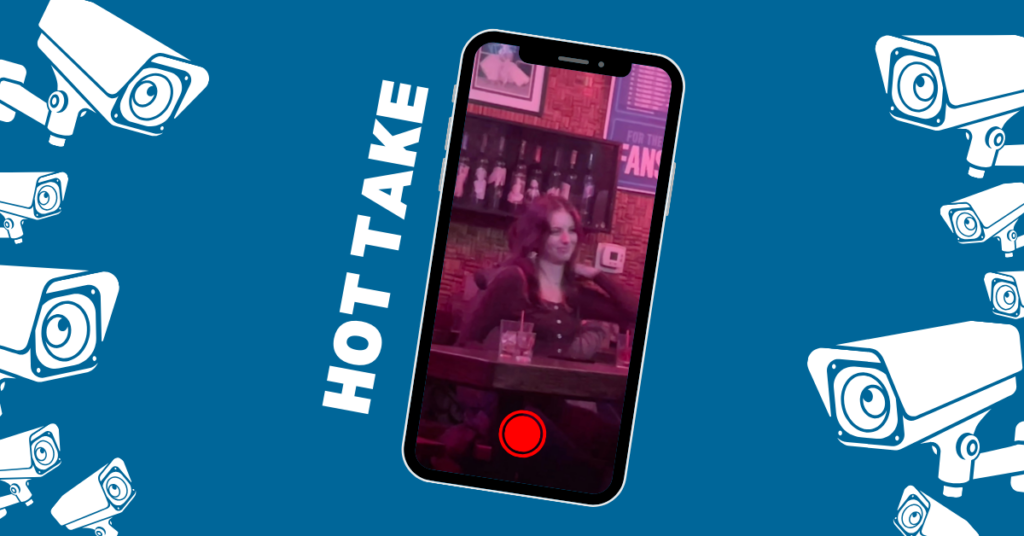Picture this: You’ve got a few minutes before you start your day, so you begin your morning social media scroll. You swipe, swipe, and swipe through random Reels and TikToks, not really internalizing most of what you watch. Every video is made by a stranger; while you may care a little, nothing deeply pulls at your heart as it would if a friend were sitting there telling you a story. Then suddenly, mid-scroll, you see a video of your mother. You’re confused. You run to the comments. Your heart is now in your stomach as you watch footage of your mom walking into the grocery store, as hundreds of thousands of people pick apart her looks, clothes, walk, everything. You’re horrified. You report the video and call your mom, who feels completely violated. Meanwhile, seven blocks down the road, the teenager who uploaded the video is being applauded in the group chat for finally going viral.
Sadly, this is the new normal. And no one is safe from this type of experience.
We’ve Stepped Over the Line
Please tell me I’m not alone in finding this behavior wildly inappropriate. To bring internet exposure to someone without their consent is not only incredibly violating but also entirely illegal. And yet, we’ve all seen countless videos like this, and they take many shapes and forms — some of which don’t seem invasive on the surface. It’s alarming that they’ve become socially acceptable.
There’s the “help me find” proactive public outing of strangers’ bad behavior, reminiscent of the “Twitter do your thing” trend many moons back. The uploader thinks (or hides behind the guise) that they’re doing someone a favor by making a video like, “If your fiancé was flying from LA to PDX yesterday and your name is Francesca — Girl, drop him because he’s cheating on you.” The video blows up, it gets stitched by people who dedicate entire accounts to finding the person in question, and the beast of social media won’t be satiated until Francesca is found and her heart is broken in two.
There’s also a huge wave of people trying to interview random street-goers. Even if the targeted interviewees fully ignore the person or mention they don’t want to be filmed, the interviewer includes that footage in their final video. And there are the “filming for my safety” videos showing someone publicly having a meltdown or harassing someone. And I’d be remiss not to mention the “counting how many amusement park couples are at Epcot” videos.
At what point do we step back and wonder, “Is this surveillance capitalism?”
The Madness Behind the Method
Think about it. Now more than ever, class mobility can be achieved via the internet. If you find a way to build a platform and drive engagement, you can turn that into income. This provides the incentive for people to do something like film a stranger, do an insane prank, or even put their or others’ safety in danger. While most people understand these are unwise or hurtful decisions, they are driven to sacrifice themselves and others by the lure of going viral. Every day is a new day to make money on social media, but the stakes just get higher and harder to achieve. We often think of surveillance as a government conspiracy theory, but in actuality, we are doing it to ourselves via TikTok and Instagram “call outs.”
In the same vein, maybe we don’t feel like this violates privacy because nowadays very little is private. Our data is mined and sold away to big companies; our phones have a scan of our face or thumb; and if you go out in public, there is always the chance that someone will capture you in videos or photos. It’s all wrapped up in this bubble of cognitive dissonance that makes us able to function in our ever-changing world.
Final Food for Thought
Not all these videos are watched with the worst intentions, so I don’t mean to seem too harsh. Often, the initial thought in our minds is, “Oh, this looks entertaining,” and we don’t detect the influence hidden away behind the curtain. I’m sure most of us have seen and giggled over the occasional “Karen” or “caught my boyfriend cheating” video. That content is raw, it’s human, and it’s the closest thing to unfiltered authenticity on social media. We may find it fascinating — but when we zoom out and think about how it will affect others’ lives, it’s actually quite terrifying.
I’m curious: Has this ever happened to you? To someone you know? Leave a comment and share your insight!
